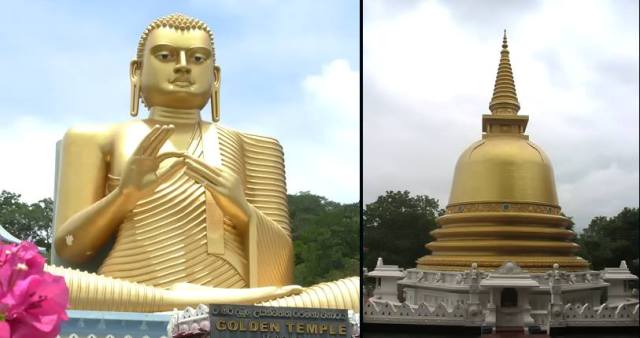 The Golden Temple Buddha in Dambulla, Sri Lanka [Facebook profile]
The Golden Temple Buddha in Dambulla, Sri Lanka [Facebook profile]
[This is an excerpt from an opinion piece in the latest edition of The Round Table: The Commonwealth Journal of International Affairs.]
Emerging from the wreckage of a civil war, Sri Lanka had the opportunity to lay the foundations of an equal society. Yet, this continuous attempt to insulate Buddhism could lead to calamitous ramifications. Since constitutions serve an expressive function of national unity, constitution-making in deeply divided societies requires rethinking of its approach when it lacks consensus on foundational principles with competing visions on national and religious identity. Constitution-making in such polarised societies attracts political attention and constitutional debates tend to exacerbate tensions. In Sri Lanka, questions on the nature of state (unitary or federal) and Buddhism have sparked heated political debates.
Embracing ‘incrementalism’ was advanced as a suitable approach as the Sri Lankan society is deeply divided on the state’s foundations. Since the ‘political constitution’ embodying the ideology of Sinhala-Buddhist nationalism supersedes the ‘legal constitution’, any conclusive constitutional settlement on religion in the constitutional text seems unlikely.
Incrementalism would then act as a means to circumvent conflicts on foundational issues. Retaining the ambiguous Article 9 provides for a longer timeframe to obtain wider consensus for reformation. It could also enable the Sri Lankan state to conform to its social pluralism. This is achieved by establishing ‘democratic procedures and space for long-term public and political debate’ which will eventually interrogate Sinhala-Buddhist nationalism and manage to upheave the ‘traditions of pluralism, tolerance and accommodation’ that had remained undiscovered in the Sri Lankan culture and history so far. In other words, incrementalism would provide time and space to reconstruct the ‘political culture’.
One could argue that the compromise in Article 6 manoeuvred by Colvin R. de Silva in the Constituent Assembly is an example of such incrementalism. Yet after 45 years, Sri Lanka still remains divided along ethnic and religious lines. As a result, it was necessary to incorporate ‘the foremost place to Buddhism’ in both formulations proposed in the Interim Report as any other alternative would be practically inconceivable. This is the limitation of incrementalism; the risk of over-rigidity of previously-made temporary choices, and the non-liberal consequences of it that compromise liberal values and basic rights that ought to be safeguarded in a constitution.
The PRC report noted ‘that it was our responsibility to also try to challenge the debate and dialogue on religion in the country thinking of the future directions our country needs to take in order to move beyond existing divisions’. Unless there is a genuine attempt to initiate such an open discourse on historical traditions of pluralism and tolerance, Sri Lanka will forever have to give into majoritarian exigencies. Even if now is not the constitutional moment to introduce democratic constitutional principles, and therefore incrementalism is desirable, it is essential that the government endeavour to remodel societal perceptions to accept what is just in a plural society.
Ayesha Wijayalath is a Research Associate with the Centre for Asian Legal Studies, Faculty of Law, National University of Singapore.
[Opinion pieces do not reflect the views of the Round Table Editorial Board].



